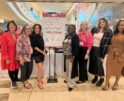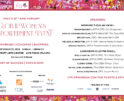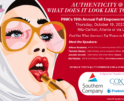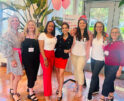
Eve Ensler, Tony award-winning author, playwright and creator of The Vagina Monologues and One Billion Rising

The Transformation Monologues
By Cynthia Good
Eve Ensler, the Tony award-winning author, playwright and creator of The Vagina Monologues and One Billion Rising, tells PINK she sees a connection between violence against women globally and lower pay and opportunity for working women everywhere.
“We still live in a culture that completely undervalues and under cherishes those who do the bulk of the work in society,” says Ensler.
Through V-Day, a global movement to end violence against women and girls, she has raised more than $90 million.
The Vagina Monologues, translated into 48 languages and performed in more than 140 countries, made generations of women more comfortable with their own bodies.

But she tells PINK she’s most proud of the City of Joy – a safe haven where Congolese rape victims learn to read, write and become part of a “worldwide movement where women are empowered and fighting for their safety and freedom.”
Her controversial, albeit best selling plays and books include her most recent, In the Body of the World.
Despite her contributions to the betterment of women worldwide, Ensler doesn’t like to think of herself as a successful career woman.
“Career sounds too individualistic. I’m interested in how we create lives,” she insists.
Ensler, who lives in Paris and New York City, is divorced and has an adopted adult son.
Here, she shares with PINK how being sexually abused as a child made her ambitious, how a near fatal struggle with cancer changed her view of work and why you need to love your job – for your soul’s sake.

Little PINK Book: Why don’t you like the word “career”?
Eve Ensler: I don’t think in terms of my career. I’m a writer involved in a movement and a life.
But we live in this society where everything is valued based on what you do, what you make, rather than who you are.
It’s not about amassing more of this and more of that. That’s not terribly interesting. What’s interesting to me is how we advance each other.
LPB: What’s your advice for women striving for success?
EE: I think we’re either in transaction or transformation. I met a transformational coach who doesn’t bring up boys to win at any cost. He brings up boys to be great human beings.
LPB: So the focus should not be advancement?
EE: Last night a woman who sat next to me at dinner told me she had a job that didn’t fill her soul. She got a tattoo on both feet quoting Rumi, “Wherever you stand, be the soul of that place.” She left her job after she got that tattoo because she wanted to be in service and connected to her soul.

LPB: You talk about being raped and beaten by your father from ages 5 to 10. How did this impact your work?
EE: When you come from a violent family and you’re told you’re stupid, and bad – you think I’ll show you. You become a person who has to prove you’re not that.
When you are raised to believe you’re not enough – not pretty or smart enough – you will never be enough no matter what you do. I felt that way my whole life.
LPB: Did you have a mentor who encouraged you?
EE: Joanne Woodward was a huge mentor to me. She directed one of my plays early on and believed in me. She mothered me and supported me.
LPB: How did your recent battle with uterine cancer change your view of work?
EE: I had stage three/four cancer. I had to get off the wheel of winning or loosing and make my life about something else. Before, I was tortured. The cancer burned away that part of me that was driven to prove myself. Now, I do it because I choose to.
LPB: You wrote that after surviving cancer, you “wake up every day and run my hand over my torso-length scar.”
EE: Having an almost fatal illness I’m profoundly grateful for life. I’m three years cancer free. I feel great.
When you have the good grace of getting to live longer than you were supposed to live, it’s incredibly precious.

LPB: Is it true the Congolese rape and beating victims you set out to save, ending up saving you?
EE: They saved my life through their prayers. And the City of Joy kept me going since it means so much to me. It kept me alive and fighting every day to see [them build] it. I like to keep my promises.
LPB: How do you define success?
EE: Being alive; being in connection with other people; realizing your life is bigger than you and part of a bigger story; and, getting to be part of that story. [In One Billion Rising], we got to be part of a movement that got a billion women to stand up to stop violence against women.
LPB: What’s the secret to your professional success?
EE: There is something about when art and social activism come together – breakthroughs happen. Also, I don’t see the obstacles. I see where we are going.
I listen to my instinct and follow my heart. If you do that you will be successful because you bring up everyone around you.
LPB: What is the biggest challenge facing working women today?
EE: Women are not being paid enough, not being appreciated enough. Working women have the burden of so much. Women carry everything and we don’t live in a society that helps women out by paying them [fairly] or providing education or childcare.
LPB: What’s the most important take away from your memoir In the Body of the World?
EE: We need to wake up and become conscious of our body so we connect with the world around us. Denial is killing us. Denial of climate change, economic impoverishment … does not keep you protected.
We have to stop destroying the planet. This is what we have to do for each other. It’s time for a revolution. This is the moment.

LPB: What will it take to right the course?
EE: The end of patriarchy. We still live in a world where the father is dominant and has the basic power over the society and violence sustains this.
Change the mindset of boys and girls at a young age to see that equality benefits everybody and that violence against women destroys the entire society.
LPB: Are women finally comfortable with their vaginas?
EE: When I started 17 yrs ago no one said “vagina.” Today everyone says it. On V-Day there are 5,000 events. People get to know their vaginas, they look at their vaginas, feel happy about their vaginas.
LPB: Are women finally comfortable with their vaginas?
EE: We take it a day at a time. Chemo burned away a lot of feelings of badness that were projected onto me. I’m not completely done, but 90 percent. One of the reasons I want to end violence against women is because the consequences are forever.
Recommended
-
Fall 2024 EventNovember 19th, 2024
-
REGISTER HERE FOR THE UPCOMING...September 19th, 2024
-
Spring Sales Are Ready To Bloo...March 1st, 2024
-
Two Months Away!August 24th, 2023
-
Pink’s Signature Spring ...May 17th, 2023















